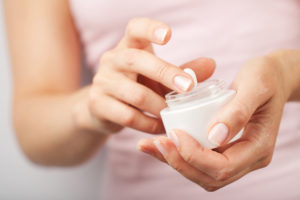
Winter delivers a double whammy to our skin.
Outside, we’re exposed to freezing temperatures. Inside, the air is hot and dry. This harsh combination strips our skin of its moisture, leading to dry, irritated and itchy skin, and raising the risk of eczema and psoriasis flares.
Mary Yurko, MD, PhD, a dermatologist affiliated with Spectrum Health Helen DeVos Children’s Hospital and associate professor in the Department of Medicine at Michigan State University, shares these tips to ward off winter skin woes:
- Take shorter showers. Long, hot showers and baths strip skin of its moisture. Shorten the length of time you are in the water and use warm or lukewarm water instead. Make sure to pat—not rub—your skin when drying off.
- Apply moisturizer after washing to replace the oil you just removed from your skin, and apply again before bed to lock in the moisture while you sleep. Try using thicker, oil-based ointments and creams instead of water-based lotions.
- Avoid harsh products. Mild soaps, body washes and cleansers that are moisturizing are best for delicate skin. Beware of alcohol-based astringents and toners or acne treatment products, which can further dry out the skin. You may want to cut back on your use of these products in the winter.
- Cover up. Reduce the amount of skin exposed to cold air by wearing hats, gloves, scarves, coats and boots. Remove wet clothing such as socks and gloves as soon as possible to prevent further skin irritation.
- Use sunscreen. The damaging rays of the sun do not hibernate in winter. Apply a broad-spectrum sunscreen with an SPF of 30 or higher to exposed skin.
- Don’t lick your lips. Instead of adding moisture, saliva has a dehydrating effect on thin lip skin. Prevent chapped lips by applying a moisturizing lip balm and covering up with a scarf when you go outside.
- Moisten the air. Use a humidifier to combat dry, furnace-blasted air indoors. Keep the humidity level at about 40%.
When selecting a moisturizer, Dr. Yurko advises that inexpensive products often work just as well as the pricier alternatives.
“Use what you like and what works for you. You don’t have to spend a fortune,” she said.
To protect hands, she recommends products with dimethicone. The ingredient prevents water loss by forming a hydrating barrier on the skin. Plus, it has a nice, silky feel.
If your skin irritation does not improve with the tips above, and lasts for more than two weeks, contact your dermatologist.
 /a>
/a>
 /a>
/a>
 /a>
/a>
Very informative, thank you
You’re most welcome, Jeleah. Glad Health Beat could help! 🙂
Great information, thank you!
What moisture cream do u recommend. I’m allergic to octisalate so avoid spf creams.
Hi Sarah – Have you tried moisturizing creams that are made for those with eczema? Eucerin has a nice one. Those seem to be easier on the skin for those with sensitivity or allergies. We recommend you discuss this issue with your physician, too, because he/she may be able to recommend something that would work great for your skin.
For those looking for a healthier approach than using moisturizers (think parabins) that have harmful chemicals, try Vitamin E oil, Almond oil (also provides UV protection) and coconut oil for all natural restoration. These can be applied topically without any side effects. Also try using a silk pillow case as silk will not absorb the moisture from your skin and hair like cotton will. Lastly, be sure to stay hydrated with water and organic lemon juice.